Software testers play a critical role in ensuring the quality and reliability of software products. They meticulously evaluate applications to identify bugs, inconsistencies, and areas for improvement, ensuring that the final product meets the required standards and provides a smooth user experience.
The skills required for a software tester include a strong understanding of testing methodologies, attention to detail, and analytical thinking. Additionally, effective communication and problem-solving abilities are essential to collaborate with development teams and report findings accurately.
Candidates can write these abilities in their resumes, but you can’t verify them without on-the-job Software Tester skill tests.
In this post, we will explore 9 essential Software Tester skills, 10 secondary skills and how to assess them so you can make informed hiring decisions.
Table of contents
9 fundamental Software Tester skills and traits
The best skills for Software Testers include Attention to Detail, Analytical Thinking, Test Automation, Programming Knowledge, Bug Tracking, Test Planning, Communication Skills, Understanding of SDLC and Critical Thinking.
Let’s dive into the details by examining the 9 essential skills of a Software Tester.
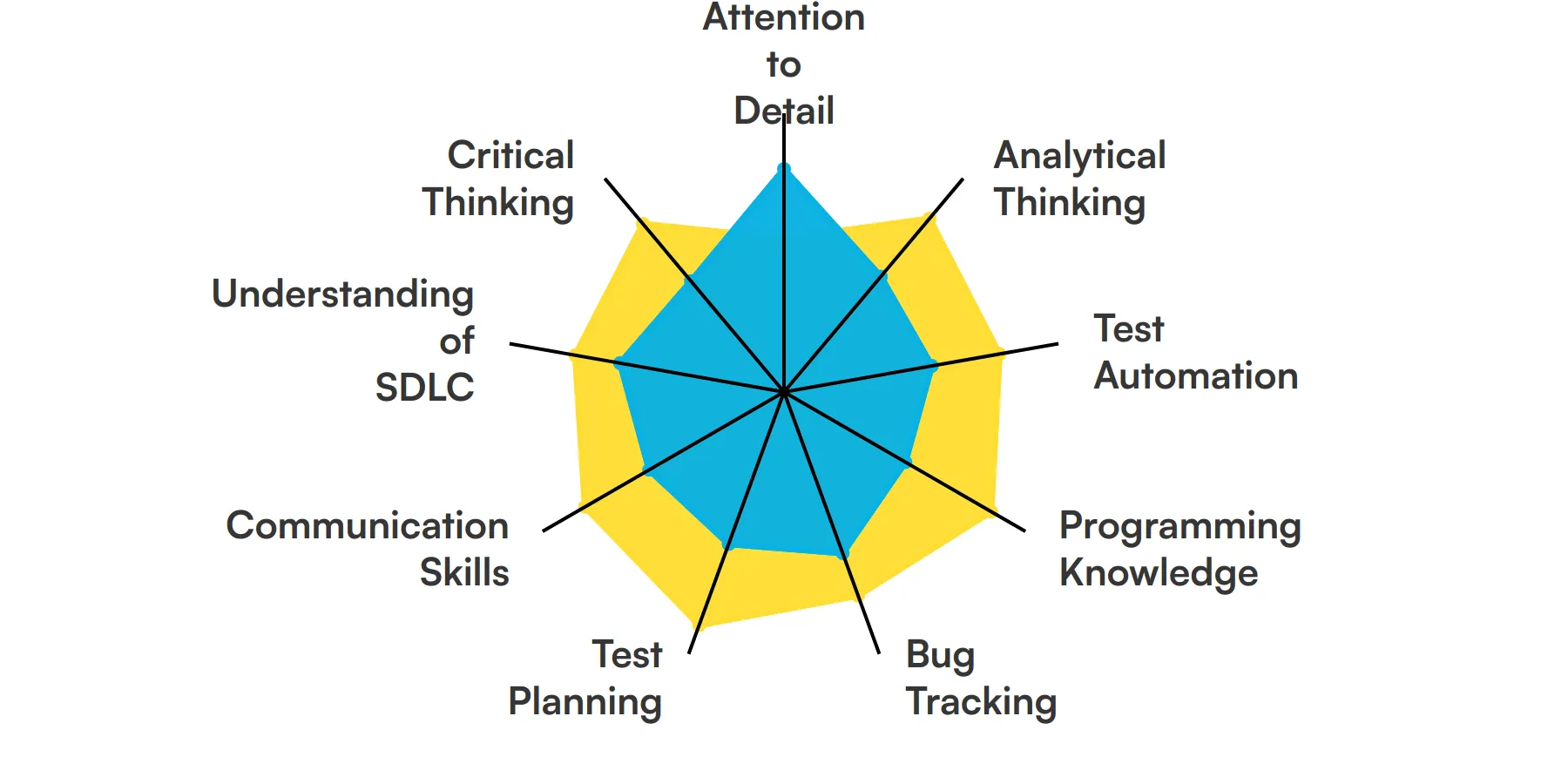
Attention to Detail
A software tester must have a keen eye for detail to identify even the smallest bugs or inconsistencies in the software. This skill ensures that no aspect of the software is overlooked, leading to a more polished and reliable product.
Check out our guide for a comprehensive list of interview questions.
Analytical Thinking
Analytical thinking allows a software tester to break down complex systems and understand how different components interact. This skill is crucial for identifying the root cause of issues and ensuring comprehensive test coverage.
Test Automation
Proficiency in test automation tools and frameworks is essential for a software tester. Automating repetitive test cases saves time and increases the efficiency of the testing process, allowing for more thorough testing.
For more insights, check out our guide to writing a Selenium Automation Tester Job Description.
Programming Knowledge
A solid understanding of programming languages such as Java, Python, or JavaScript is important for writing automated tests and understanding the software's codebase. This knowledge helps testers create more effective and targeted test cases.
Bug Tracking
Familiarity with bug tracking tools like JIRA or Bugzilla is necessary for documenting and managing defects. This skill helps software testers communicate issues clearly and track their resolution progress.
Check out our guide for a comprehensive list of interview questions.
Test Planning
Creating detailed test plans and test cases is a fundamental skill for a software tester. This involves outlining the scope, objectives, resources, and schedule of testing activities to ensure comprehensive coverage.
Communication Skills
Effective communication is key for a software tester to collaborate with developers, product managers, and other stakeholders. Clear and concise reporting of test results and issues ensures that everyone is on the same page.
Understanding of SDLC
A deep understanding of the Software Development Life Cycle (SDLC) helps testers align their testing activities with the development process. This knowledge ensures that testing is integrated seamlessly from the initial stages to the final release.
Critical Thinking
Critical thinking enables a software tester to evaluate the software from different perspectives and anticipate potential issues. This skill is essential for designing effective test cases and identifying edge cases.
10 secondary Software Tester skills and traits
The best skills for Software Testers include SQL Knowledge, Performance Testing, Security Testing, Mobile Testing, API Testing, Version Control, Usability Testing, Cross-Browser Testing, Continuous Integration and Soft Skills.
Let’s dive into the details by examining the 10 secondary skills of a Software Tester.
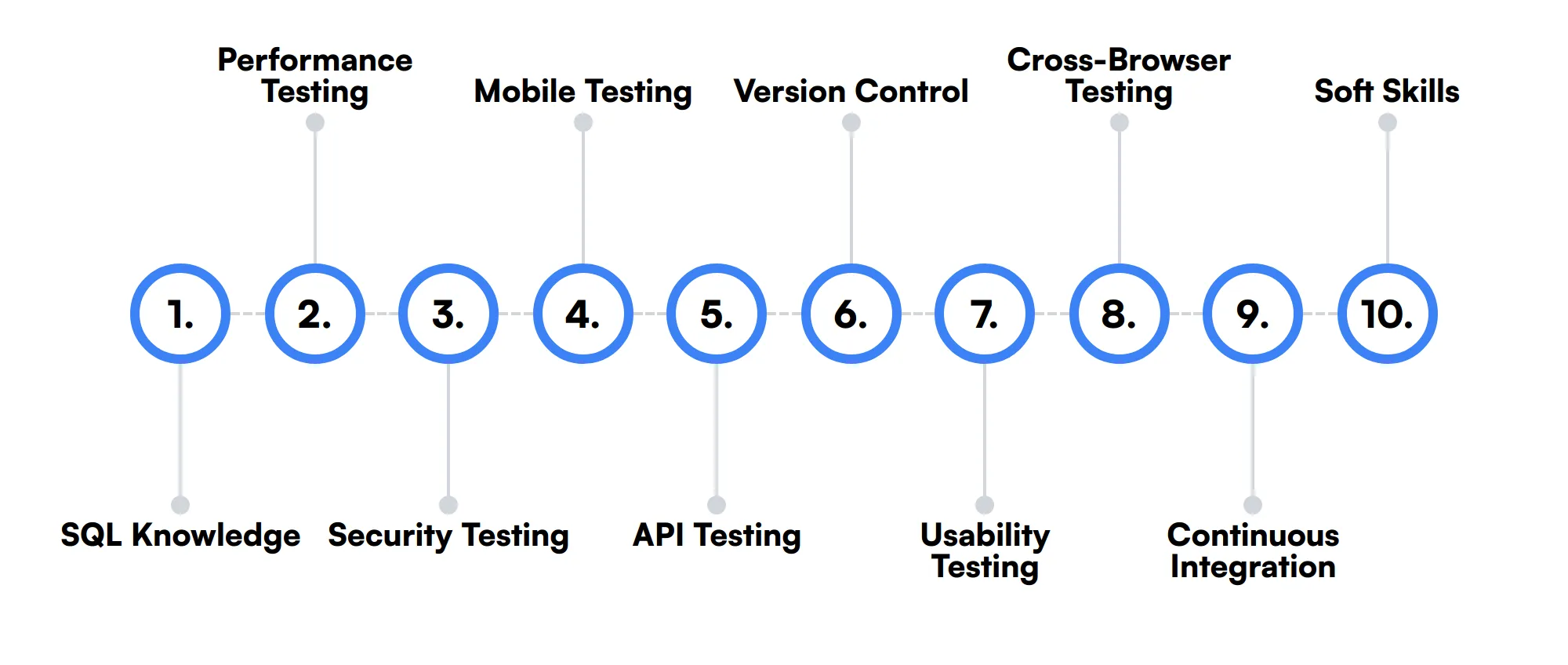
SQL Knowledge
Understanding SQL is beneficial for a software tester to validate data integrity and perform backend testing. This skill helps in querying databases to ensure that data is stored and retrieved correctly.
Performance Testing
Knowledge of performance testing tools like JMeter or LoadRunner allows testers to assess the software's performance under various conditions. This ensures that the application can handle high loads and perform efficiently.
Security Testing
Familiarity with security testing techniques helps testers identify vulnerabilities and ensure that the software is secure against potential threats. This skill is crucial for protecting sensitive data and maintaining user trust.
Mobile Testing
Experience with mobile testing tools and techniques is important for testers working on mobile applications. This includes testing on different devices and operating systems to ensure compatibility and performance.
API Testing
Proficiency in API testing tools like Postman or SoapUI is valuable for testing the interactions between different software components. This skill ensures that APIs function correctly and handle various inputs and outputs as expected.
Version Control
Knowledge of version control systems like Git is useful for managing test scripts and collaborating with the development team. This skill helps in tracking changes and maintaining the integrity of test artifacts.
Usability Testing
Understanding usability testing principles helps testers evaluate the user experience and identify areas for improvement. This skill ensures that the software is user-friendly and meets the needs of its intended audience.
Cross-Browser Testing
Experience with cross-browser testing tools ensures that the software works consistently across different web browsers. This skill is important for delivering a seamless user experience regardless of the browser used.
Continuous Integration
Familiarity with continuous integration tools like Jenkins or Travis CI helps testers integrate their tests into the development pipeline. This ensures that tests are run automatically with each code change, catching issues early.
Soft Skills
While technical skills are paramount, soft skills like teamwork, adaptability, and problem-solving are also important for a software tester. These skills help in collaborating effectively and navigating the dynamic nature of software projects.
How to assess Software Tester skills and traits
Assessing the skills and traits of a Software Tester goes beyond just glancing at their resume. While a resume might highlight their experiences and certifications, it doesn't provide a clear picture of their practical abilities or how they'll perform in real-world testing scenarios. To truly understand a candidate's capability, a hands-on approach is necessary.
Software Testers need a unique set of skills ranging from attention to detail and analytical thinking to more technical abilities like test automation and programming knowledge. Each of these skills plays a critical role in their ability to effectively identify bugs, plan tests, and communicate findings. Therefore, evaluating these skills thoroughly is key to finding the right tester for your team.
One effective way to assess these skills is through customized assessments that simulate real testing environments. Adaface offers a variety of assessment tests that can help you evaluate a candidate's proficiency in areas critical to a Software Tester's role, such as bug tracking, test planning, and understanding of the Software Development Life Cycle (SDLC). Using these assessments can lead to a 2x improvement in the quality of your hires.
Let’s look at how to assess Software Tester skills with these 6 talent assessments.
Attention To Detail Test
Our Attention To Detail Test evaluates a candidate's ability to meticulously process information, ensuring high-quality output by focusing on tasks such as proofreading, verifying data, and detecting typos.
The test assesses skills in following instructions, checking consistency, and identifying mistakes, which are crucial for detail-oriented work.
Candidates who score well demonstrate a high level of thoroughness and an ability to maintain focus on detailed tasks without errors.
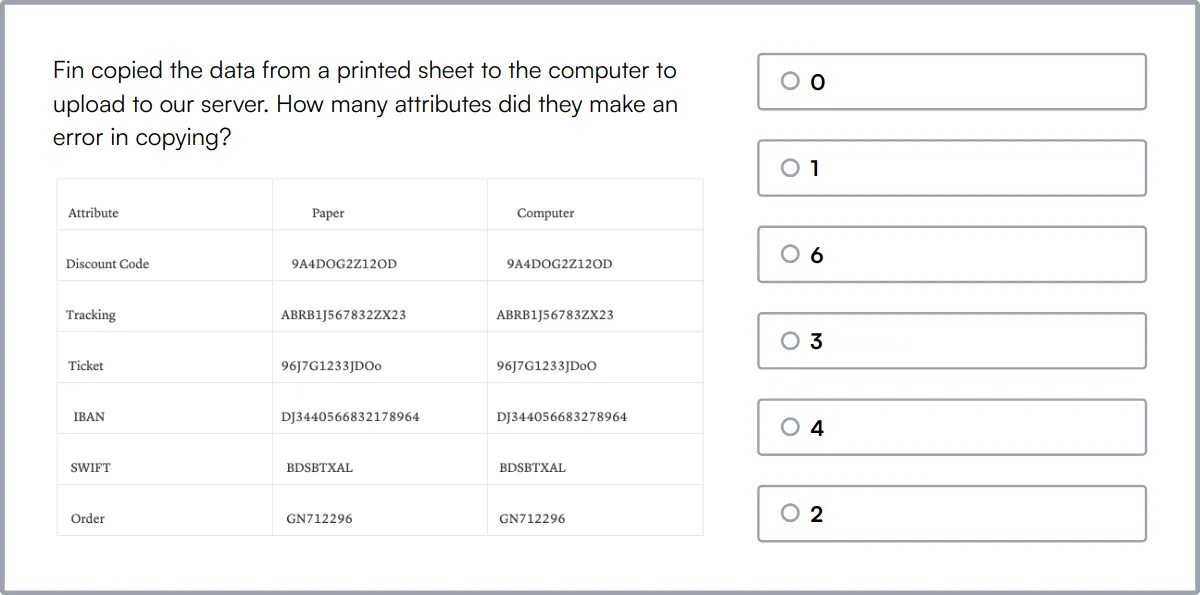
Analytical Skills Test
Our Analytical Skills Test measures a candidate's ability to analyze data, apply logic, and draw conclusions from complex scenarios, covering areas like data visualization and critical thinking.
This test challenges candidates with questions on logical reasoning, numerical reasoning, and data interpretation, requiring them to identify key information and find patterns.
High performers are adept at solving complex problems and can effectively communicate their analytical process and conclusions.
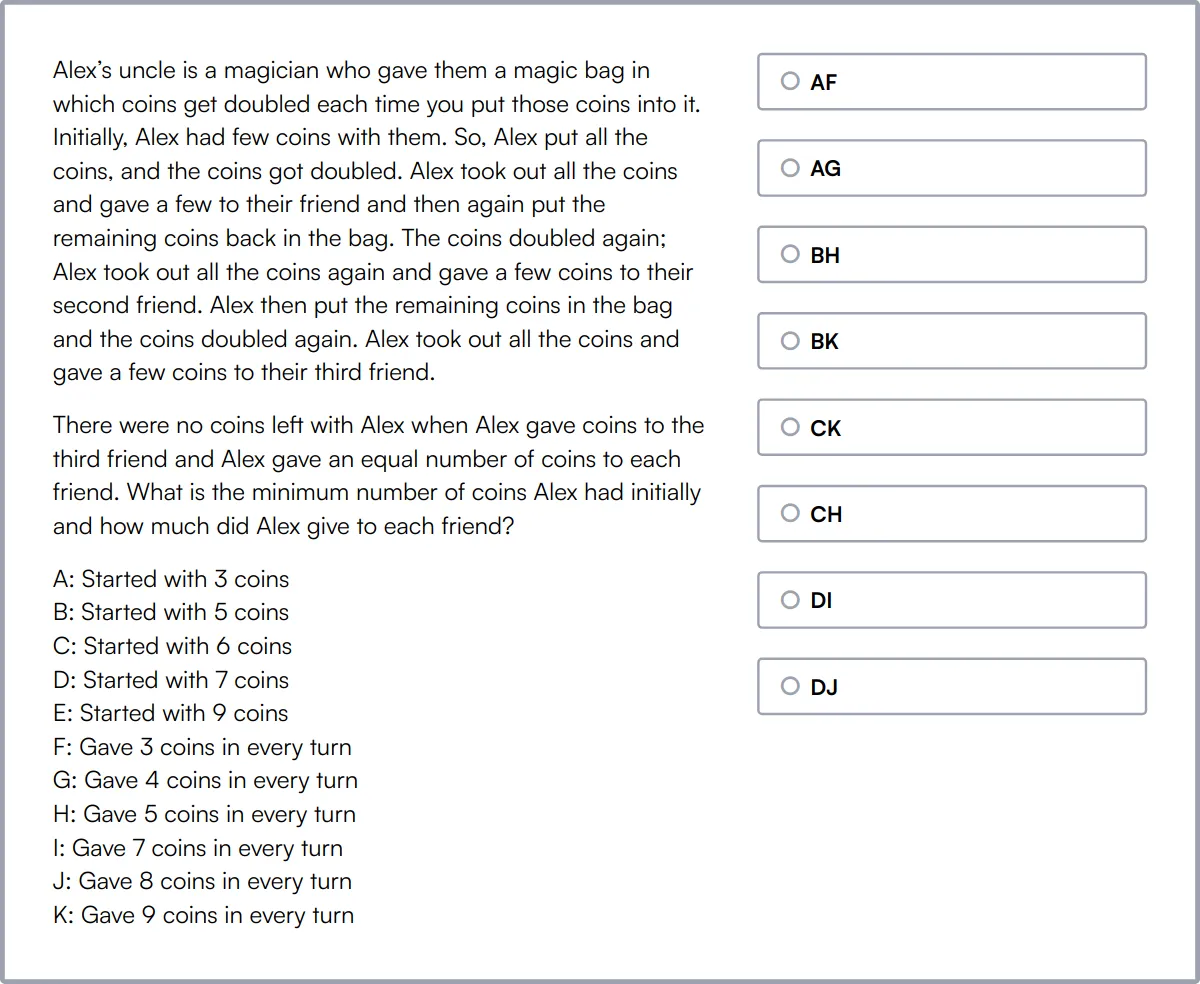
Selenium Online Test
The Selenium Online Test assesses candidates on their proficiency with Selenium WebDriver, including aspects like cross-browser testing, API testing, and performance testing.
Candidates are tested on their ability to interact with live websites, build frameworks, and utilize Selenium Grid for testing across multiple browsers.
Successful candidates will demonstrate strong capabilities in automating tests, developing custom frameworks, and generating detailed reports.
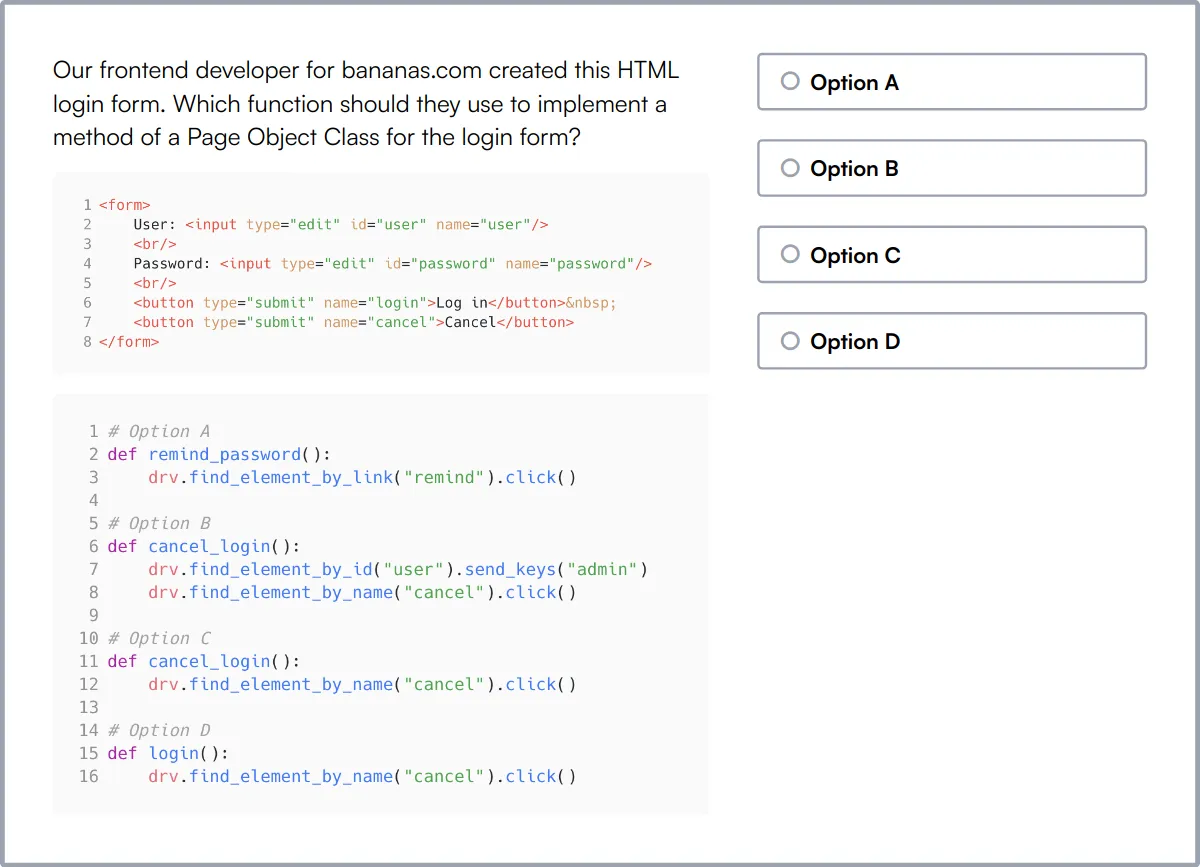
Python Online Test
Our Python Online Test evaluates a candidate's expertise in Python programming, focusing on data structures, error handling, and object-oriented programming.
The assessment includes scenario-based questions and a coding challenge to test skills in scripting, web scraping, and database manipulation using Python.
Candidates excelling in this test show a deep understanding of Python's capabilities and can efficiently implement complex solutions.
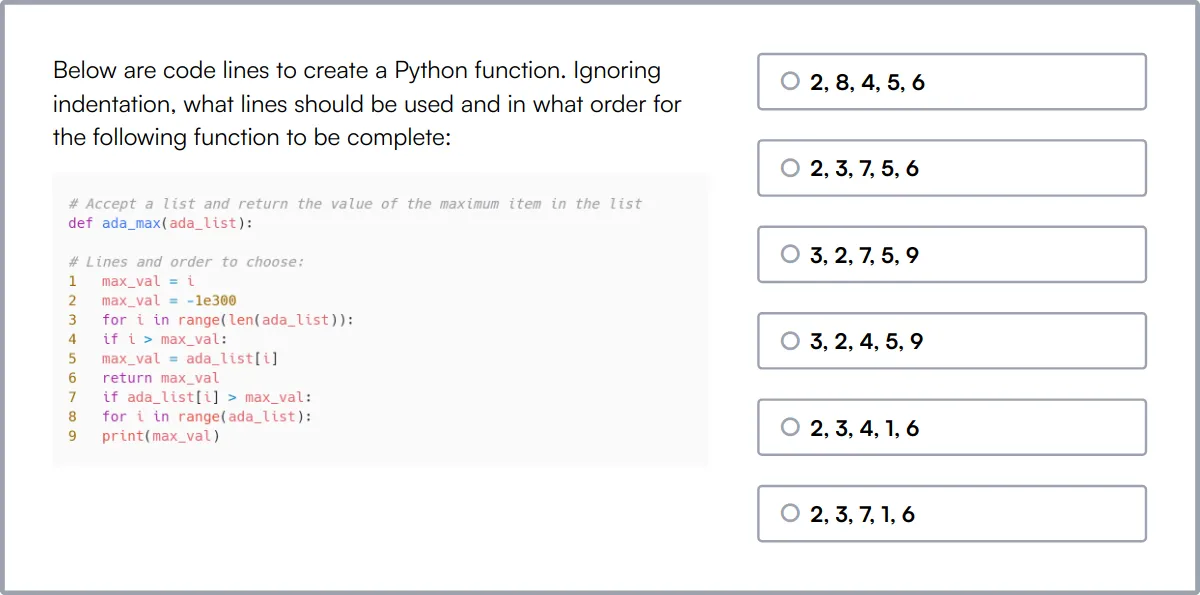
Jira Online Test
The Jira Online Test gauges a candidate's understanding of Jira Software Cloud, focusing on Agile methodologies such as Scrum and Kanban, and the use of Agile boards.
This test evaluates knowledge in managing backlogs, sprints, and administering Jira, essential for effective project management in software development environments.
Skilled candidates will demonstrate proficiency in using Jira to streamline project workflows and enhance team productivity.
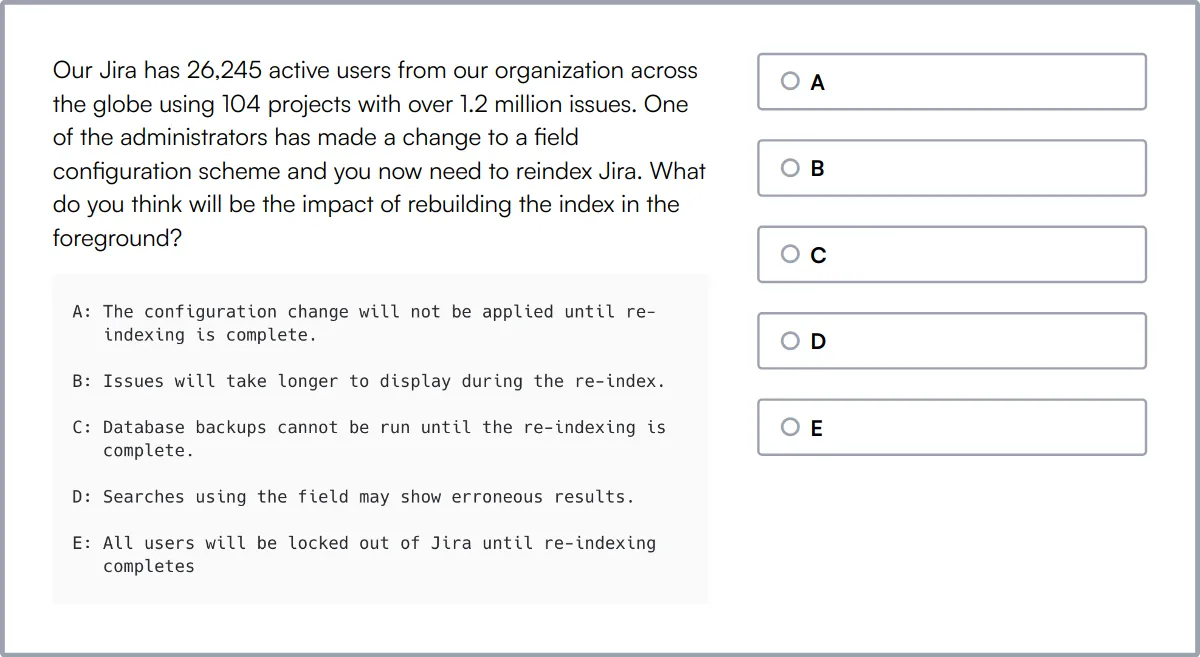
QA Engineer Test
Our QA Engineer Test assesses a candidate's knowledge in quality assurance, covering testing fundamentals, software life cycle, and test design techniques.
The test includes questions on Selenium and Linux fundamentals, as well as programming and testing skills necessary for effective QA practices.
Candidates who perform well are proficient in planning, executing, and managing comprehensive testing strategies to ensure software quality.
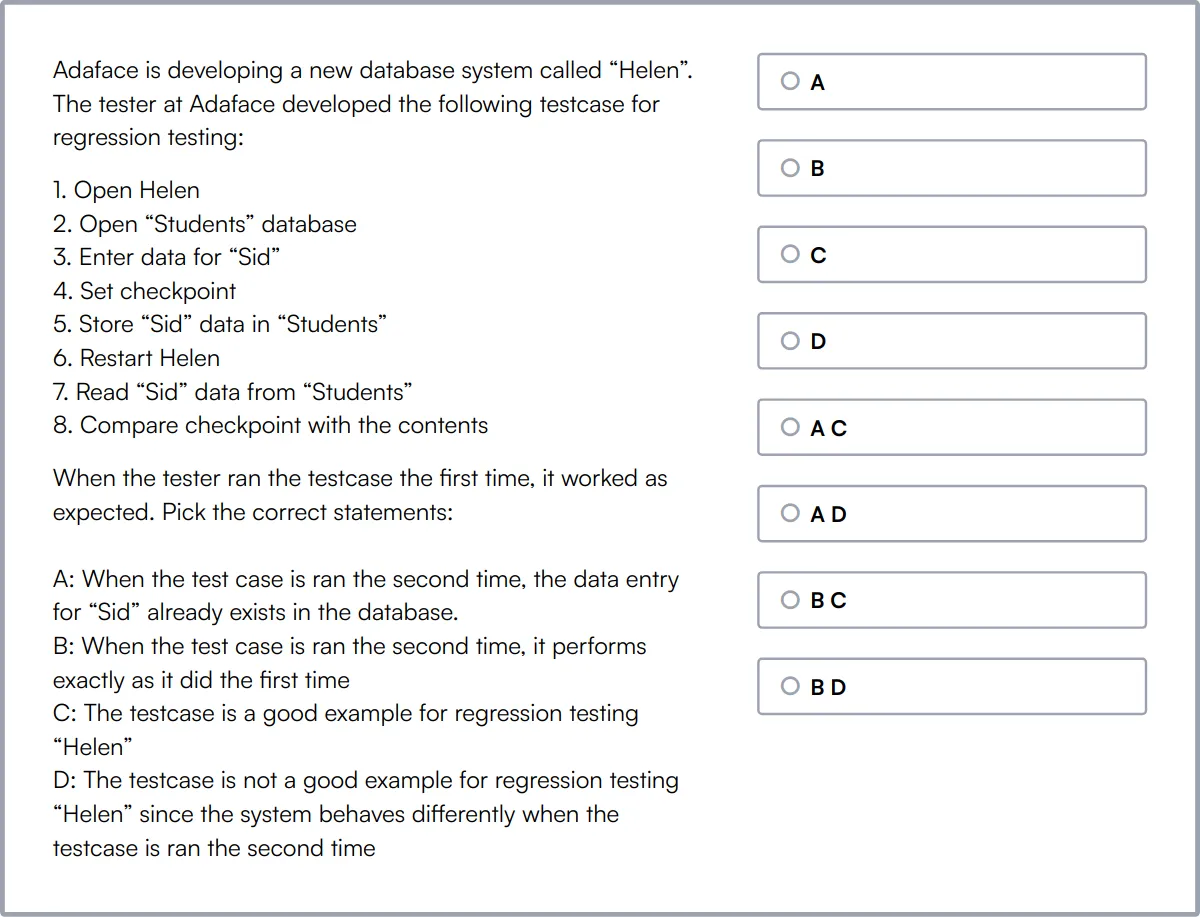
Summary: The 9 key Software Tester skills and how to test for them
| Software Tester skill | How to assess them |
|---|---|
| 1. Attention to Detail | Evaluate precision in executing test cases and spotting discrepancies. |
| 2. Analytical Thinking | Assess ability to break down complex software issues systematically. |
| 3. Test Automation | Check proficiency in using automation tools and scripting tests. |
| 4. Programming Knowledge | Test understanding of programming languages relevant to testing frameworks. |
| 5. Bug Tracking | Review effectiveness in using bug tracking tools and reporting. |
| 6. Test Planning | Examine skills in designing test strategies and coverage plans. |
| 7. Communication Skills | Observe clarity and effectiveness in written and verbal communication. |
| 8. Understanding of SDLC | Determine familiarity with various software development life cycle models. |
| 9. Critical Thinking | Judge ability to question assumptions and solve testing problems. |
Appium iOS Online Test
Software Tester skills FAQs
What skills are important for a software tester?
Key skills include attention to detail, analytical thinking, test automation, programming knowledge, and understanding of SDLC. Additionally, proficiency in bug tracking, test planning, and various types of testing like performance, security, and mobile testing are important.
How can recruiters assess a candidate's test automation skills?
Recruiters can assess test automation skills by asking candidates to demonstrate their experience with automation tools and frameworks, discuss past projects, or solve a real-world problem during a technical interview.
What is the role of SQL knowledge in software testing?
SQL knowledge allows testers to verify data integrity and interact with databases to check how applications handle data. Testers may need to write or modify SQL queries to create test cases and validate outcomes.
Why are communication skills critical for software testers?
Effective communication is key for testers to clearly report bugs, explain test cases, and collaborate with developers and other team members. It ensures that issues are understood and addressed promptly.
How does understanding SDLC benefit software testers?
Understanding SDLC helps testers integrate their work at the right stages, ensuring timely and relevant testing. It also enables them to better collaborate with other team members involved in the development process.
What types of testing should a software tester be familiar with?
A competent software tester should be familiar with performance testing, security testing, mobile testing, API testing, cross-browser testing, usability testing, and continuous integration practices.
How important are soft skills in the software testing field?
Soft skills, such as problem-solving, teamwork, and adaptability, are critical as they enhance a tester's ability to work effectively in diverse teams and adapt to changing technologies and methodologies.
What is the significance of version control in software testing?
Version control is significant as it helps testers manage changes to test scripts, collaborate on code, and maintain a history of modifications, which is crucial for tracking and understanding changes over time.
Assess and hire the best Software Testers with Adaface
Assessing and finding the best Software Tester is quick and easy when you use talent assessments. You can check out our product tour, sign up for our free plan to see talent assessments in action or view the demo here:

40 min skill tests.
No trick questions.
Accurate shortlisting.
We make it easy for you to find the best candidates in your pipeline with a 40 min skills test.
Try for freeRelated posts
Free resources



